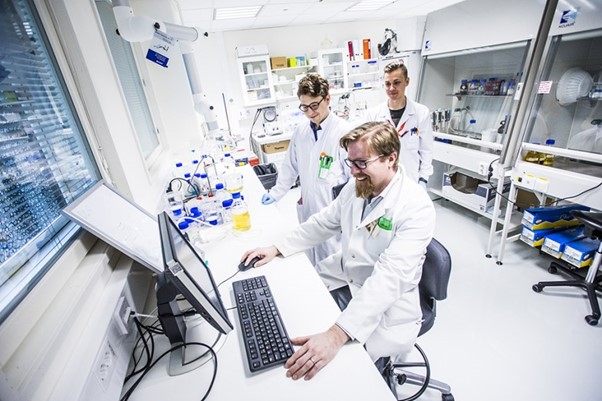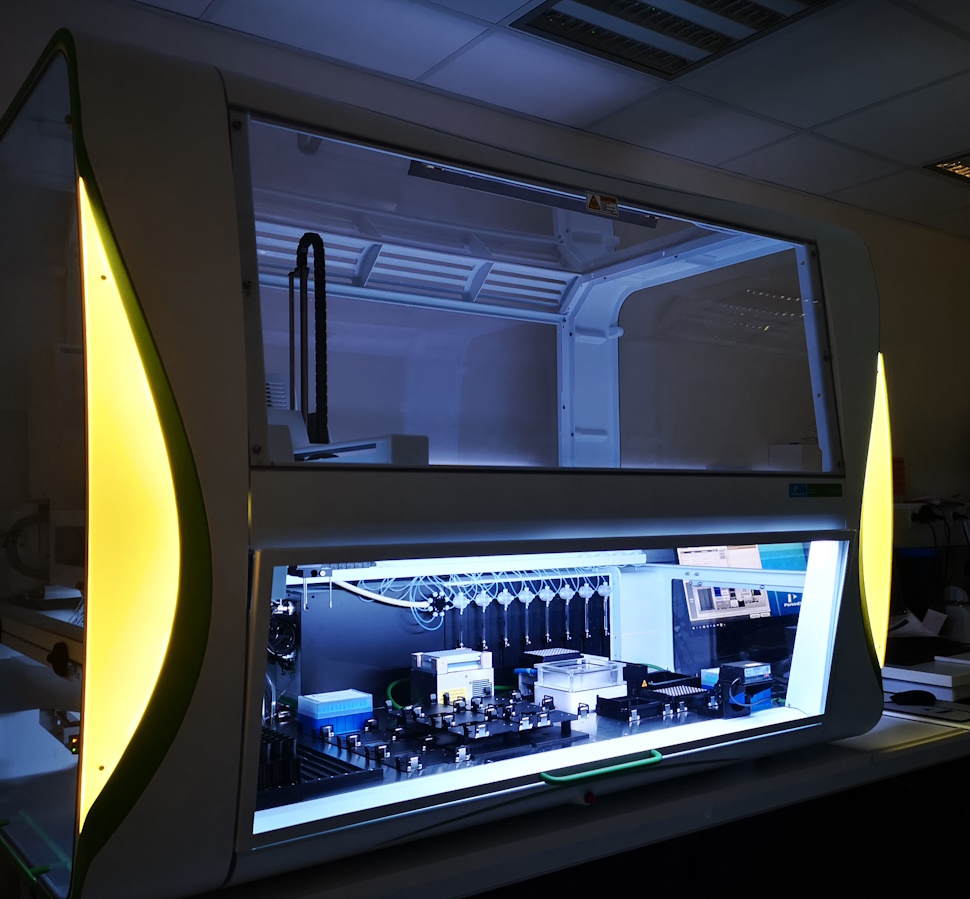Protein and Proteome Network (PPN) provides nationally coordinated services ranging from MS and non-MS-based proteomics to protein production and biophysical characterization. PPN comprises of nodes from Helsinki, Oulu, Tampere and Turku, offering multiple techniques for a thorough characterization of individual proteins, dynamic protein complexes, and their networks.
Tampere Protein Services core offers services in protein production and purification. An array of biophysical characterization methods is available, including calorimetry, biosensor methods, light scattering methods and spectroscopic methods. Turku Proteomics Facility offers a wide range of mass spectrometry -based proteomics services, for protein identification, quantitative proteomics, and analysis of protein post-translational modifications and protein interactions. PPN Helsinki offers quantitative characterization of diverse proteomics samples, ranging from clinical specimens to cell models. Phosphoproteomics, structural proteomics, and advanced domains like affinity proteomics, XL-MS, and single-cell proteomics are available. PPN Oulu integrates a wide range of services for protein analysis, ranging from mass spectrometry to biophysical characterization including ITC, SPR, SLS, DLS, CD, BLI and both steady state and stopped-flow fluorescence. The unit also provides both MS and 2D-gel based proteomic services.
Tampere Protein Services core offers services in protein production and purification. An array of biophysical characterization methods is available, including calorimetry, biosensor methods, light scattering methods and spectroscopic methods. Turku Proteomics Facility offers a wide range of mass spectrometry -based proteomics services, for protein identification, quantitative proteomics, and analysis of protein post-translational modifications and protein interactions. PPN Helsinki offers quantitative characterization of diverse proteomics samples, ranging from clinical specimens to cell models. Phosphoproteomics, structural proteomics, and advanced domains like affinity proteomics, XL-MS, and single-cell proteomics are available. PPN Oulu integrates a wide range of services for protein analysis, ranging from mass spectrometry to biophysical characterization including ITC, SPR, SLS, DLS, CD, BLI and both steady state and stopped-flow fluorescence. The unit also provides both MS and 2D-gel based proteomic services.
Nodes
UH: University of Helsinki; UO: University of Oulu; UTU: University of Turku; TAU: Tampere University; ÅAU: Åbo Akademi University.
Contact details
Platform Chair
Vesa Hytönen
vesa.hytonen@tuni.fi
Services
Tampere Protein Services core
Tampere Protein Services core offers services in protein production and purification. The instrumentation within the facility enables development of pilot-scale production protocols and there is equipment available, for example for demanding protein formulation involving tangential flow filtration. Tampere offers an array of biophysical characterization methods, including calorimetry (ITC, DSC), biosensor methods (SPR, BLI), light scattering methods (DLS, SLS, SEC-SLS/DLS, Mass Photometry) and spectroscopic methods (Fluorescence, FP), which are seamlessly integrated into service pipeline.
Turku Proteomics Facility
Turku Proteomics Facility offers a wide range of mass spectrometry-based proteomics services for protein identification, quantitative proteomics, and analysis of protein post-translational modifications and protein interactions. The unit has set up chemical proteomics techniques for drug target discovery, SCoPE2 workflow for single-cell proteomics, and SureQuant methods for large-scale targeted proteomics. Turku Proteomics facility collaborates closely with Turku Screening unit to develop automated workflows for high-throughput clinical proteomics and to provide a comprehensive drug discovery package, and with Turku Metabolomics Centre to provide integrative omics analyses.
PPN Helsinki
PPN Helsinki offers analysis services that emphasize the quantitative characterization of diverse proteomics samples, ranging from clinical specimens to cell models. The services cover clinical to tissue proteomics, phosphoproteomics, structural proteomics, and advanced domains like affinity proteomics, XL-MS, single-cell proteomics and imaging mass spectrometry. The HiLIFE- Proteomics Unit has established an automated sample processing pipeline for FFPE samples, enabling the detection of thousands of proteins from biobank paraffin samples. Currently, PPN Helsinki collaborates with the FIMM Digital Microscopy and Molecular Pathology Unit within the BF Biobank Technologies platform to integrate this technology into a comprehensive digital pathology service line. The Helsinki node develops Structural proteomics in affiliation with Instruct-ERIC.
PPN Oulu
PPN Oulu integrates a wide range of services for protein analysis, ranging from mass spectrometry to biophysical characterization and binding studies including CD, DSF, ITC, SPR and BLI. The unit also provides MS and 2D-gel based proteomic services. Access to biophysical characterization is also offered internationally through Instruct-ERIC with additional services including DLS, SLS and steady/pre-steady state (stopped-flow) kinetics together with the structural biology unit of Oulu.
Recent user publications
Loss-of-function mutation in IKZF2 leads to immunodeficiency with dysregulated germinal center reactions and reduction of MAIT cells. Hetemäki I, Kaustio M, Kinnunen M, Heikkilä N, Keskitalo S, Nowlan K, Miettinen S, Sarkkinen J, Glumoff V, Andersson N, Kettunen K, Vanhanen R, Nurmi K, Eklund KK, Dunkel J, Mäyränpää MI, Schlums H, Arstila TP, Kisand K, Bryceson YT, Peterson P, Otava U, Syrjänen J, Saarela J, Varjosalo M, Kekäläinen E. Science Immunology. 2021, 6(65):eabe3454
Pavic, K., Gupta, N., Omella, J.D., Derua, R., Aakula, A., Huhtaniemi, R., Määttä, J.A., Höfflin, N., Okkeri, J., Wang, Z., Kauko, O., Varjus, R., Honkanen, H., Abankwa, D., Köhn, M., Hytönen, V.P., Xu, W., Nilsson, J., Page, R., Janssens V., Leitner, A., Westermarck, J. Structural mechanism for inhibition of PP2A-B56α and oncogenicity by CIP2A, Nature Communications 2023,14:1143
Iris Seitz, Sharon Saarinen, Esa-Pekka Kumpula, Donna McNeale, Eduardo Anaya-Plaza, Vili Lampinen, Vesa P Hytönen, Frank Sainsbury, Jeroen JLM Cornelissen, Veikko Linko, Juha T Huiskonen, Mauri A Kostiainen. DNA-origami-directed virus capsid polymorphism. Nature Nanotechnology. 2023, 18:1205–1212.
Obaji E,Maksimainen MM, Galera-Prat A, Lehtiö L. Activation of PARP2/ARTD2 by DNA damage induces conformational changes relieving enzyme autoinhibition. Nature Commununications. 2021, 9;12(1):3479.
Kankuri E, Finckenberg P, Leinonen J, Tarkia M, Björk S, Purhonen J, Kallijärvi J, Kankainen M, Soliymani R, Lalowski M, Mervaala E. Altered acylcarnitine metabolism and inflexible mitochondrial fuel utilization characterize the loss of neonatal myocardial regeneration capacity. Experimental & Molecular Medicine. 2023, 55(4):806-817.

Tampere Protein Services Core. Photo: Jonne Renvall, TUNI

Mass Photometry user training in Tampere Protein Services node. Photo: Vesa Hytönen


